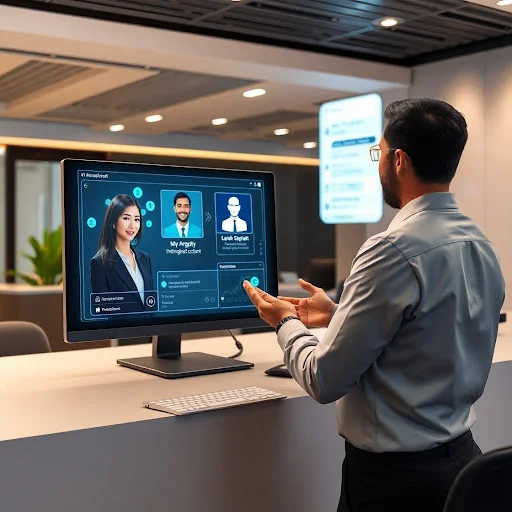Introduction
In today’s fast-paced business world, efficient communication is crucial. AI technologies are changing how we handle first contacts and ongoing communications. This article explores how an AI receptionist can improve business communications across various industries, making operations more efficient and customers happier. By using advanced artificial intelligence, businesses can automate routine tasks, reduce mistakes, and provide service to their clients and customers all day and night.
Key Takeaways: AI Receptionists in Business
- 24/7 Availability: Ensures constant communication and support
- Improved Efficiency: Automates routine tasks and reduces human error
- Cost-Effective: Reduces overhead costs associated with human receptionists
- Scalability: Easily handles increased call volumes without additional resources
- Consistent Service: Delivers uniform responses and brand messaging
- Multi-lingual Support: Can communicate in various languages seamlessly
- Data Collection: Gathers valuable insights from customer interactions
- Integration: Works with existing CRM and business systems
What Is an AI Receptionist?
Overview of Core Functions
An AI receptionist is a smart software that handles different communication tasks for businesses. These virtual assistants can answer calls, schedule appointments, manage visitors, and respond to customer questions without human help. They use advanced technology to understand context, recognize speech patterns, and even detect emotions in voice communications. This allows them to provide a smooth and professional experience for businesses of all sizes.
How the Technology Works
AI receptionists use advanced technologies to mimic human-like interactions:
- Natural Language Processing (NLP) to understand and interpret human speech, allowing for nuanced conversations and accurate interpretation of customer needs
- Machine Learning to improve responses over time, adapting to new scenarios and refining communication strategies based on accumulated data
- Voice Recognition to identify and authenticate callers, enhancing security and personalising interactions
- Sentiment Analysis to gauge caller emotions and adjust responses accordingly, ensuring empathetic and appropriate communication
- Deep Learning algorithms to continuously improve decision-making processes and response accuracy
How an AI Receptionist Enhances Business Communications
Immediate Response Times
AI receptionists answer right away, which makes customers happier. This quick response can make your business look better to customers. By not making people wait and helping them immediately, AI receptionists can give businesses an advantage in customer service. They can also handle many questions at once, so no customer has to wait, even when it’s really busy.
Efficient Call Routing and Message Handling
These systems are great at sending calls to the right department and taking accurate messages without mistakes. This means important information is never lost or misunderstood. AI receptionists can quickly figure out what a call is about and send it to the best person or department, making things faster and more efficient. They can also decide which calls are more urgent, making sure the most important issues are dealt with quickly.
24/7 Availability
By using an AI receptionist, businesses can talk to clients professionally at any time, without delays or missed calls, even outside normal work hours. This can be really helpful for businesses that work with people in different time zones. It lets companies help customers and give them information anytime, which can make customers happier and maybe even increase sales. Being available all the time is especially good for businesses that need to handle emergencies or give immediate help, like healthcare or IT support.
Consistency in Customer Interactions
AI receptionists always give the same answers to common questions, which helps keep your brand’s voice consistent. This consistency helps build trust with your customers. By giving standard information and following set rules, AI receptionists can avoid the mix-ups that might happen with human errors or different interpretations. This is especially useful for businesses with many locations or big customer service teams, as it makes sure every customer gets the same high-quality experience no matter when or how they contact the company.
Industries That Benefit Most from AI Receptionists
Healthcare Providers
In healthcare, AI receptionists can book appointments, answer basic patient questions, and quickly handle emergency calls. This helps medical staff focus more on taking care of patients. AI receptionists can also help decide how urgent calls are and guide patients to the right resources. They can handle prescription refill requests, send reminders about appointments, and even give basic health information, all while following healthcare privacy rules like HIPAA.
Law Firms and Consultancies
For professional services, AI receptionists are great at handling initial client questions, booking consultations, and screening calls. This lets lawyers and consultants focus on their main work without missing important client communications. AI receptionists can also share basic legal information, like office hours and what services the firm offers. They can prioritize calls based on how urgent they are or how important the client is. They can also help with checking for conflicts of interest and gathering initial client information, making it easier to bring on new clients.
Hospitality and Retail
In businesses that deal directly with customers, AI receptionists can handle guest questions, confirm reservations, and keep track of orders. This improves customer service while freeing up staff to handle more complex tasks. For hotels, AI receptionists can manage room bookings, provide information about amenities, and even help with virtual check-ins and check-outs. In retail, they can handle product questions, process simple orders, and give updates on shipping and delivery. AI receptionists can also connect with inventory systems to provide real-time stock information and suggest alternative products when items are out of stock.
Industries Benefiting from AI Receptionists
- Healthcare: Appointment booking, patient queries, emergency call routing, prescription management
- Law Firms: Client enquiries, consultation bookings, call screening, conflict checks
- Hospitality: Guest questions, reservation management, order tracking, virtual check-ins
- Retail: Customer service, product information, order status updates, inventory checks
- Financial Services: Account inquiries, transaction processing, fraud alerts
- Education: Student enrollment, course information, academic calendar updates
- Real Estate: Property listings, scheduling viewings, rental/lease information
- Technology Support: Troubleshooting guidance, software updates, ticket creation
Important Considerations When Implementing an AI Receptionist
Customisation Capabilities
It’s important to set up the AI to match your brand’s style, words, and procedures. This makes sure the AI receptionist represents your business accurately and professionally. Customization should go beyond just scripting to include knowledge specific to your industry, company policies, and even local dialects or cultural differences. Being able to fine-tune the AI’s responses and decision-making helps businesses create a more authentic customer experience. The AI should also be able to learn and adapt over time, using feedback and new information to keep getting better at its job and staying relevant to the business.
Integration with Existing Systems
Make sure the AI receptionist works well with your current CRM platforms, scheduling software, and customer service channels. Smooth integration is key to get the most benefits from an AI receptionist. This integration should allow for real-time data exchange, so the AI can access up-to-date customer information, appointment schedules, and product details. It should also be able to update these systems based on interactions, keeping all customer touchpoints in sync. Think about how well the integration can grow with your business and adapt to new technologies you might use in the future.
Privacy and Compliance
Follow GDPR standards and data protection rules when handling customer information. This is crucial for maintaining trust and following the law. Put strong security measures in place to protect sensitive data, including encryption for data being sent and stored. Make sure the AI receptionist is programmed to handle data in line with relevant industry regulations, like HIPAA for healthcare or PCI DSS for financial transactions. Regularly check and update privacy practices to stay current with changing regulations and best practices in data protection.
Hybrid Support
Set up a smooth transition to live human support for complex questions. While AI can handle many tasks, some situations may need human help. Design your system with clear steps for when to pass a call to a human, allowing the AI to recognize when a question is too complex and smoothly transfer the interaction to a human agent. This hybrid approach ensures that customers get the best possible service, combining the efficiency of AI with the empathy and problem-solving skills of human staff. Also, use these human interactions as learning opportunities for the AI, continuously improving its ability to handle more complex scenarios over time.
The Future of Business Communications with AI
Advances in Conversational AI
Future AI receptionist systems are expected to sound more natural and understand context better. This will make conversations with AI even smoother and more human-like. Improvements in natural language processing will allow AI to engage in more nuanced conversations, picking up on subtle cues and responding with appropriate emotion and tone. We can expect AI receptionists that can understand and speak multiple languages fluently, breaking down language barriers in global business communications. Also, the addition of visual AI could allow for video-based interactions, where AI receptionists can read and respond to visual cues, making the communication experience even better for customers.
Increasing Adoption by SMEs
Smaller businesses are starting to use AI receptionists more to compete with bigger companies in customer service. This levels the playing field and lets small businesses offer 24/7 support. As AI technology becomes cheaper and easier to use, we’ll likely see more small and medium-sized businesses adopting it. These businesses will be able to provide high-level customer service without needing a large staff. AI receptionists will become easier to customize and set up, allowing even businesses with limited tech resources to use this technology. This could lead to a big change in how small businesses operate and compete globally.
The Balance Between Human and AI
The future is about combining AI efficiency with human empathy for the best customer experience. This mixed approach ensures that businesses can use the best of both worlds. We can expect to see smarter AI systems that can work seamlessly with human agents, giving them real-time information and suggestions during customer interactions. This teamwork between AI and human staff will allow for more personalized and effective problem-solving. Additionally, AI might start to take on more proactive roles in managing customer relationships, predicting customer needs and starting conversations to address potential issues before they happen. The key will be finding the right balance, using AI to enhance and support human interactions rather than completely replace them.
AI Adoption in UK Businesses
Large Enterprises (250+ employees)
Medium Businesses (50-249 employees)
Small Businesses (10-49 employees)
Micro Businesses (1-9 employees)
Conclusion
AI receptionists are changing business communications by offering faster responses, better call routing, 24/7 availability, and consistent service. As businesses look to improve their customer interactions, using AI technology can bring big benefits while still keeping the human touch where needed. By carefully thinking about how to implement AI and staying up-to-date with new technology, companies can use AI receptionists to improve their communication strategies and stay competitive in an increasingly digital business world. Using AI receptionists isn’t just about upgrading technology; it’s a strategic change in how businesses approach customer service and operational efficiency.
While more businesses are using AI for communications, it’s important to remember that the goal is to enhance, not replace, human interactions. The most successful implementations will be those that find the right balance between AI efficiency and human empathy, creating a seamless and satisfying experience for customers and clients. As AI technology gets better, we can expect to see even more sophisticated AI receptionists that can handle increasingly complex tasks and situations. However, the human element will remain crucial in building lasting relationships and handling sensitive or complex situations that require emotional intelligence and critical thinking. The future of business communications lies in using the power of AI to boost and empower human capabilities, creating a partnership that delivers exceptional customer experiences and helps businesses grow.





